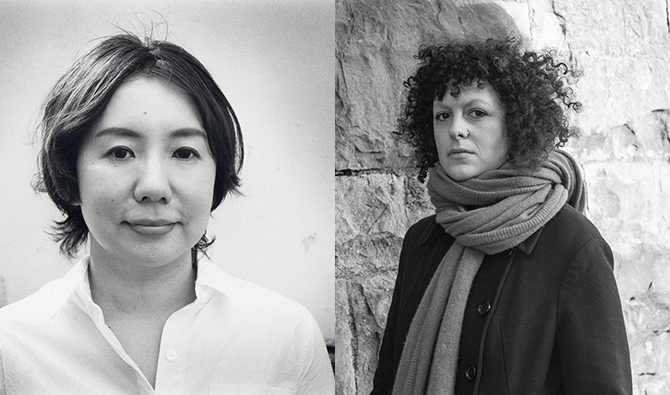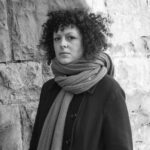
Novelist and short story writer Tomoka Shibasaki took part in a Japanese to English workshop led by translator and writer Polly Barton at the BCLT Summer School 2021. The workshop was generously supported by the Tadashi Yanai Initiative for Globalizing Japanese Humanities at UCLA and Waseda University. Here, Shibasaki-san and Polly find themselves collaborating once more on a blog which reflects on the experience of translating as a group, through a laptop screen.
TS: The feeling of being present while your own work is translated is an inexplicably strange one—during the week of the summer school, I felt this more pressingly than ever.
PB: Tomoka Shibasaki and I agree to write a joint blog post about our time at the BCLT summer school. The process will be as follows: she will write something in Japanese, I will translate it into English and then find a way to work it up into a piece that incorporates both of our voices. Simple. No?
To me translation had always been, first and foremost, the means by which books written in other languages moved closer to me. Then, thanks to the experience of participating in overseas literary events and having my books translated into various different languages, it had also become the process by which words moved away from me, spreading out into the world beyond. Now, at the summer school, translation also became multiple possibilities. It became discussion, imagination, choices and decisions.
After a couple of weeks, Shibasaki-san sends me her draft. I sit down (in fact, I’m on a train, so already sitting down) to translate it, and suddenly, I’m back in the workshop again. Which is to say—in a place of endless doubt.
Listening to ten people engaging in animated discussion onscreen, I found myself recalling the time I visited the set for a novel of mine that was being made into a film. I heard the director and actors speak about the personalities of the novel’s characters, the meaning of their lines. These words, that had started off life inside my head, had become the words of a novel, a film, and were now moving. I’m not someone who thinks an author knows everything about the works they create. The issues that the translation process throws up are crucially important. Through the process, I found myself thinking constantly about why I’d chosen that particular word, what kind of scene I was trying to convey. I found that I would sometimes understand what I’d written in a new way.
‘I found myself thinking constantly about why I’d chosen that particular word, what kind of scene I was trying to convey.’
I have translated Shibasaki-san’s work before. This was one of the reasons I chose to invite her on the workshop, in fact. We have a relationship, and on top of that, I have a relationship with her prose. I have come to know how her prose sounds in my voice. But now, translating her draft, I have in my head not just my voice, but the voices of all the people on the workshop too. I have the group, inside my head, and then I feel the panic I imagine that everyone in the Japanese group felt at some point, if not numerous points, over the course of the week. Namely: maybe a decision will never be reached.
The pandemic has meant that people can’t get together to talk in the same physical location, and that’s a shame, but it has made us more familiar with using technologies that bring together people in far-off locations. The squares lined up on screen were sharing the same moment, whilst also belonging to their own separate streams of time. For the final presentation, the range of locations widened even further, and we heard the sounds of various different languages one after another, bring into being a highly complex and rich space. Some kinds of experimentations can only happen when people are far apart; there are things that can only be achieved in this way.
Doubt as a word, a concept, doesn’t get a good rap in English. But I heard recently on a podcast—about Jungian therapy, of all things—that the etymology of the word doubt is ‘duo’. To wit: to feel doubt is to be in two minds, to be undecided between two things. To have a second voice in your head.
‘Opening up my screen everyday to be connected with this multiplicity of languages, places and times, calmed me.’
As we rehearsed the day before the final presentations, it was dusk in Tokyo, and the sunset was particularly beautiful. I could hear the distant sound of fireworks marking the opening ceremony of the Tokyo Olympics. Tokyo still found itself in the strange state it had been since last year, where citizens were being asked to restrict their movements, and yet the past week had been a turbulent one, dissent erupting because the Olympics was going ahead despite the pandemic and the residents’ opposition. I felt weary with it all. Opening up my screen everyday to be connected with this multiplicity of languages, places and times, calmed me. I feel that my time on the summer school will help me in working out where, and to whom, I should be writing my books for.
I wonder if the translator’s doubt, or at least the summer school participant’s doubt, needs a new name—one that suggests not just two voices, or minds, or options, but at least ten. Duobt, perhaps. Or just: screaming.
Above anything, I feel very grateful to have shared this time with the ten translators and with Polly, working together to enrich language.
I consider deleting this conclusion of Shibasaki-san’s, because we are tight on words, and because I find it difficult to translate this Japanese phrase, kotoba o fukameru (literally: making words deeper). But then I decide not to. Because I am grateful for the experience, also, and I want to think of enriching, deepening—the depth of language, the act of making it deeper—as not only a multiplicity of voices, but explicitly as choosing to let them echo. To not cutting them off. That, it seems to me, is a good a formulation of what the summer school is about as any.
 Polly Barton is a Japanese translator and writer based in Bristol. Stories she has translated have appeared in Words Without Borders, Granta, and The White Review. Full-length translations include Spring Garden by Tomoka Shibasaki (Pushkin Press), Where the Wild Ladies Are by Aoko Matsuda (Tilted Axis Press), and There’s No Such Thing as an Easy Job by Kikuko Tsumura (Bloomsbury). Her debut book Fifty Sounds, awarded the 2019 Fitzcarraldo Editions Essay Prize, comes out in April 2021.
Polly Barton is a Japanese translator and writer based in Bristol. Stories she has translated have appeared in Words Without Borders, Granta, and The White Review. Full-length translations include Spring Garden by Tomoka Shibasaki (Pushkin Press), Where the Wild Ladies Are by Aoko Matsuda (Tilted Axis Press), and There’s No Such Thing as an Easy Job by Kikuko Tsumura (Bloomsbury). Her debut book Fifty Sounds, awarded the 2019 Fitzcarraldo Editions Essay Prize, comes out in April 2021.
 Tomoka Shibasaki was born in 1973 in Osaka. In 2000, she published her debut, A Day On The Planet, later made into a 2004 film by Isao Yukisada. Her 2007 novel Sono machi no ima wa (That Town Today) was awarded the Geijutsu Sensho Newcomers Prize, the Sakunosuke Oda Award and the Sakuya Konohana Award. In 2010, her novel Asako I & II received the Noma Newcomer’s Award; the book was subsequently adapted for screen by Ryusuke Hamaguchi and screened at Cannes. In 2014, Shibasaki won the Akutagawa Award for her book Spring Garden, now translated into many languages including English (published by Pushkin Press). Her latest work is A Hundred Years and a Day, an experimental collection of thirty-three stories. Other notable works include Panorara, Machidōshii (I Can’t Wait), Sen no Tobira (A Thousand Doors), and Watashi ga inakatta machi de (In a Town Where I Wasn’t).
Tomoka Shibasaki was born in 1973 in Osaka. In 2000, she published her debut, A Day On The Planet, later made into a 2004 film by Isao Yukisada. Her 2007 novel Sono machi no ima wa (That Town Today) was awarded the Geijutsu Sensho Newcomers Prize, the Sakunosuke Oda Award and the Sakuya Konohana Award. In 2010, her novel Asako I & II received the Noma Newcomer’s Award; the book was subsequently adapted for screen by Ryusuke Hamaguchi and screened at Cannes. In 2014, Shibasaki won the Akutagawa Award for her book Spring Garden, now translated into many languages including English (published by Pushkin Press). Her latest work is A Hundred Years and a Day, an experimental collection of thirty-three stories. Other notable works include Panorara, Machidōshii (I Can’t Wait), Sen no Tobira (A Thousand Doors), and Watashi ga inakatta machi de (In a Town Where I Wasn’t).
You may also like...
Chi Ta-wei & Jeremy Tiang
Translator, fiction writer, and academic researcher Ta-wei Chi in conversation with novelist, playwright and translator Jeremy Tiang

9th September 2021
Elvira Dones on identity and translation
In conversation at the BCLT Summer School 2019

7th August 2020
Poetry Isn’t Lost In Translation, It Is Translation
Somrita Ganguly and Arunava Sinha share their experience of working together on the Emerging Translator Mentorship programme

31st August 2018






